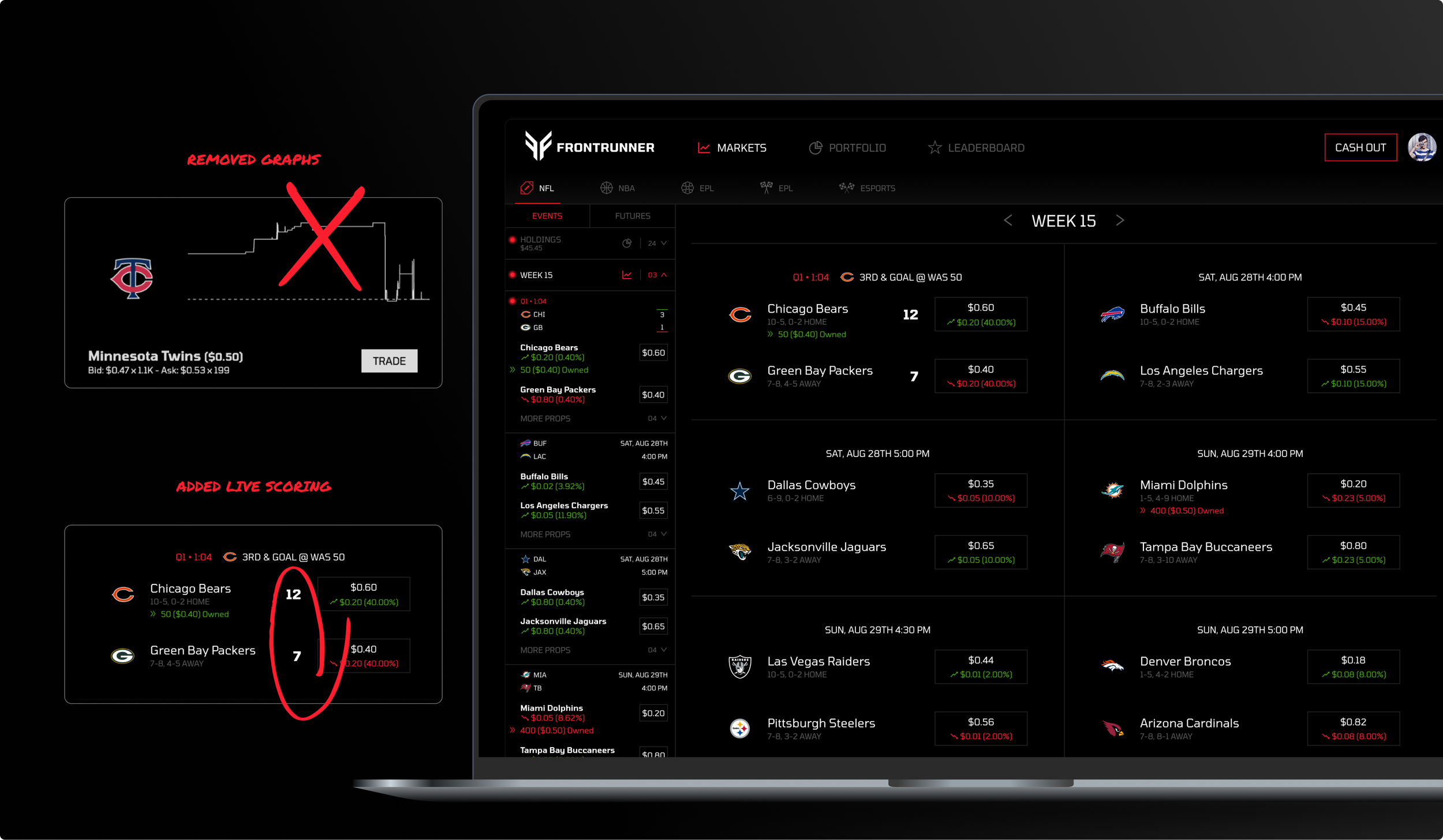Frontrunner: Sports prediction market
Set Your Own Odds: Introducing the Stock Market for Sports Betting
Traditional Sportsbooks e.g. Draftkings, bookies, and casinos set the odds in their favor. This leaves bettors with no alternatives. Additionally, bets are illiquid, sports books have betting limits, and can refuse profitable customers.
In order to disrupt traditional sportsbooks, we built the first decentralized sports prediction market, providing the best odds by enabling users to buy and sell shares of their favorite players and teams, mirroring the dynamics of the stock market.
Role: Product Design
Initial Research & Findings
Key Takeaways
• Sportsbooks are very cluttered and hard to navigate
• Sportsbooks lack education and onboarding for users
• Sportsbooks hide their data
• Investor apps like Robinhood educate users
• Investor apps have strong data visualization
• Investor apps provide strong portfolio insights
Information Architecture
We sketched out the tasks users would need to complete to get the full benefit of the product’s value and created IA based on it.
Prototype & Usability Test
Tasks
We had users complete buy and sell orders of trending MMA fighters and asked them follow up questions in order to see if they were able to complete the tasks and understand the stock market for sports concept.
Results: Success
We hit the success metrics we laid out along with validation that the concept of sports betting through buying and selling positions was intuitive for our audience.
Quotes
“I think it’s a good trade to be out from under these shares that look as if they’re falling in value, but I would personally hang on to them and see if they go back up in a couple more fights.”
“It’s decreasing so better sell it now before it gets worse.”
“I liked the Navigation. The UI was very nice and easy to understand”
Handoff Process to Engineering
Working in collaboration with engineering throughout the whole process, we developed a streamlined process for delivery that included a design walkthrough, creation of red lines, and building a design spec in Notion that linked to all the components and patterns within figma.
We also annotated if there were specific elements such as gestures, haptics or animations that needed to be called and explained.
New Features
We included Futures markets to broaden our portfolio of markets and provide more opportunities for our user to increase their ROI.
Enhancements
Through user surveys and feedback, we included several enhancements, including the shift from trend lines (graphs) to live scoring and price inclusion within the wager buttons.
Moderated Testing
We ran four moderated tests where we watched users make trades as they normally would and then we followed up with a list of questions.
Summary of Findings
The #1 ask from our testers and community was to focus on mobile, many of our users wanted to utilize our product on the go and lacked a great way to do so.
Other Findings
• Bet slip could be simplified by removing “shares”
• Users preferred custodial wallets
• Crypto enthusiasm was lacking with sports bettors
Mobile MVP
Process
Step 1: Identified the quickest path to wagering for the users
Step 2: Identified reusable components to create mobile
Step 3: Built prototype for testing
Step 4: Ran an open card sort for naming convention
Step 5: Test was successful
Step 6: Handed off red-lines and design spec for MVP
Step 7: Ran daily QC
Step 8: Watched user sessions in Maze
Mobile Optimized
As we were building mobile, we identified a need to open our mobile app up to cash-outs and non-binary markets (markets where you can bet on ties/draws).
Taking all of our research, I redesigned mobile incorporating complex features into bespoke buttons, scoreboard inspired UI, and a simplified way to wager that incorporates a new way to select your bid or ask from the order book.
Conclusion
At this juncture, we began conducting 'real money tests.' It was during these tests that we encountered a low score on the question, 'Would you be disappointed if you could never bet with Frontrunner again?' This indicated a deeper issue with product-market fit that required attention.
The realization that users were not responding to the value propositions of improved odds, limit orders, and cashouts was concerning. This feedback was further validated by our marketing efforts, prompting our decision to pivot and introduce Bet Feed."








